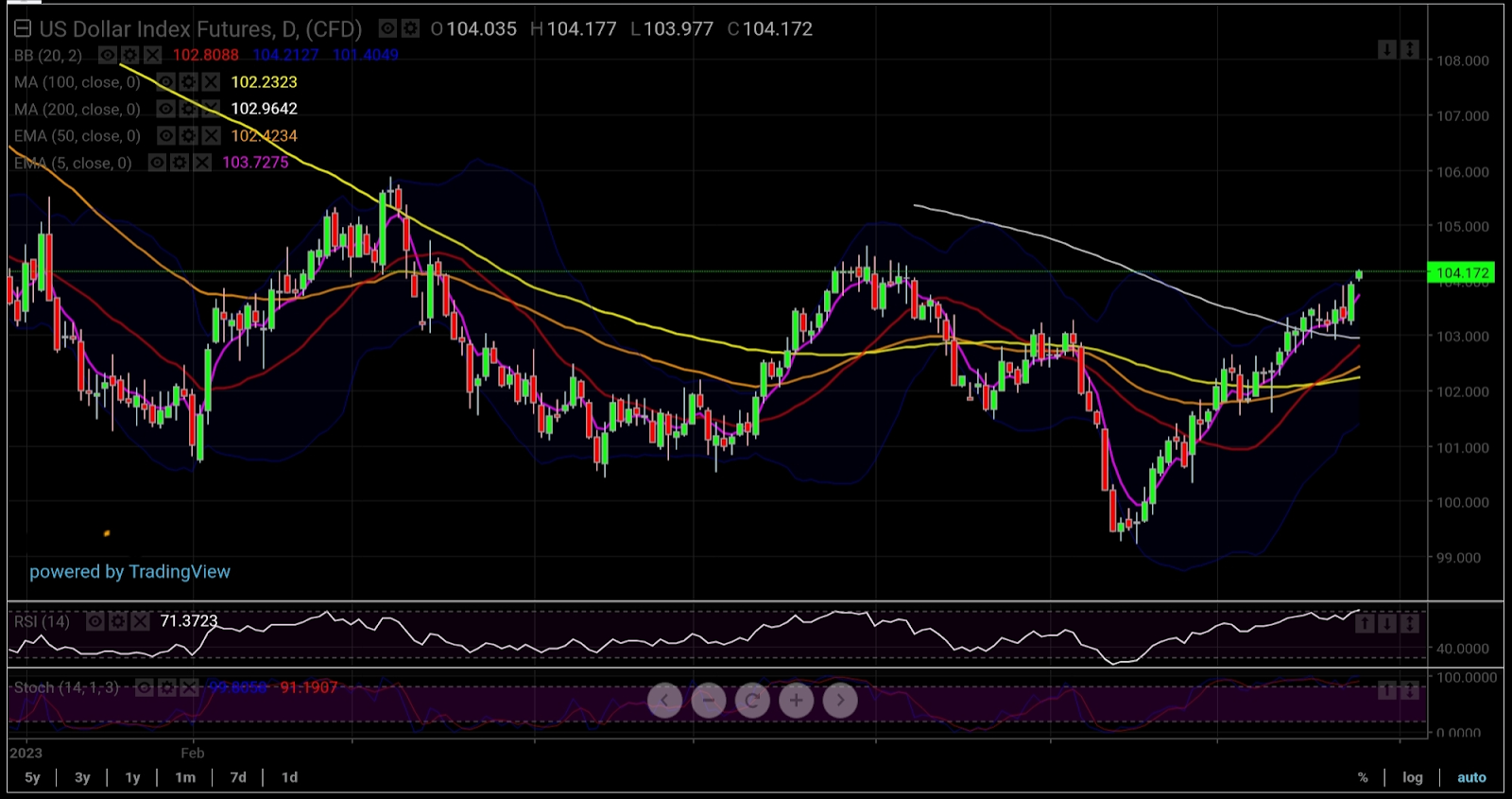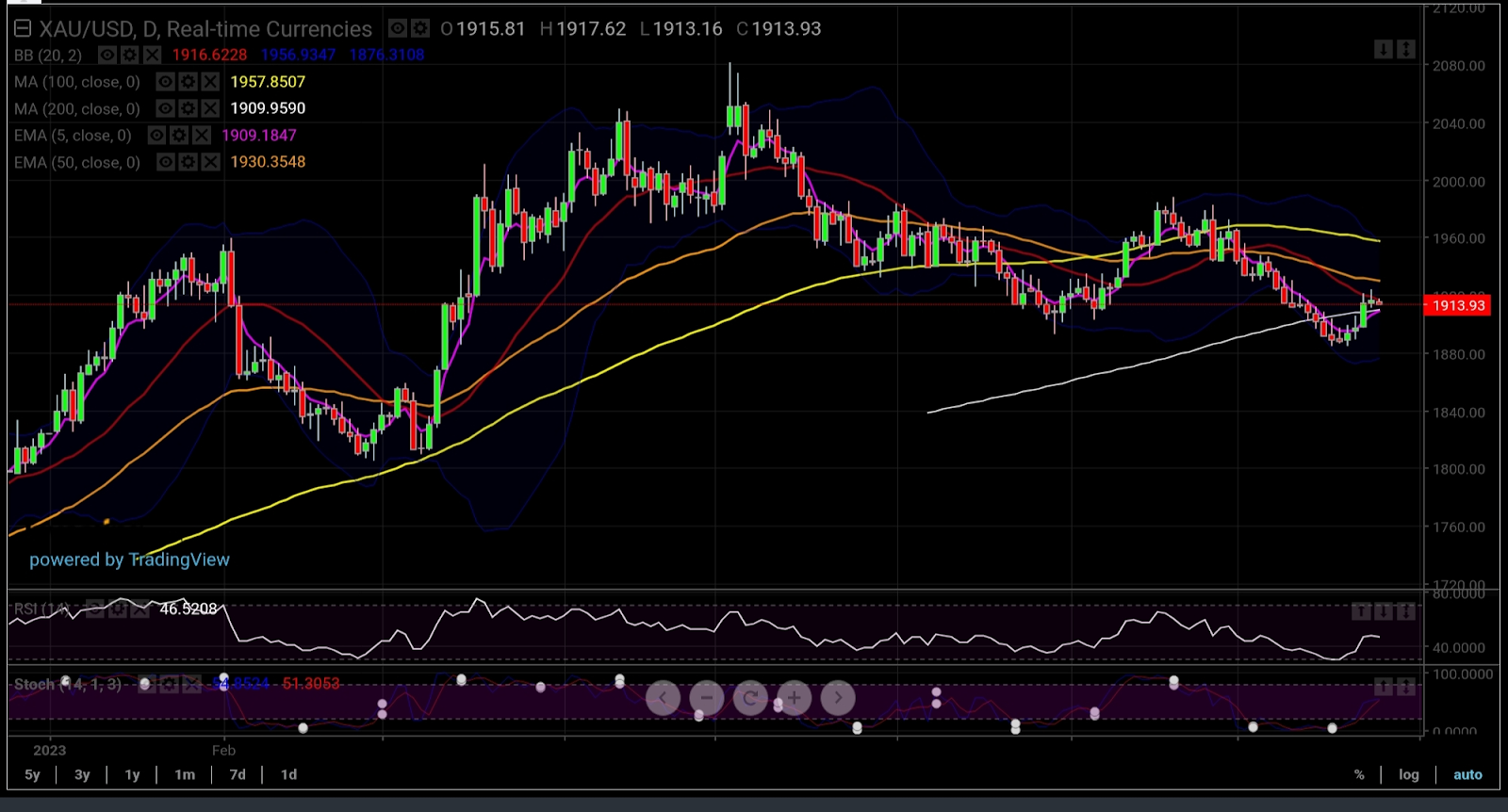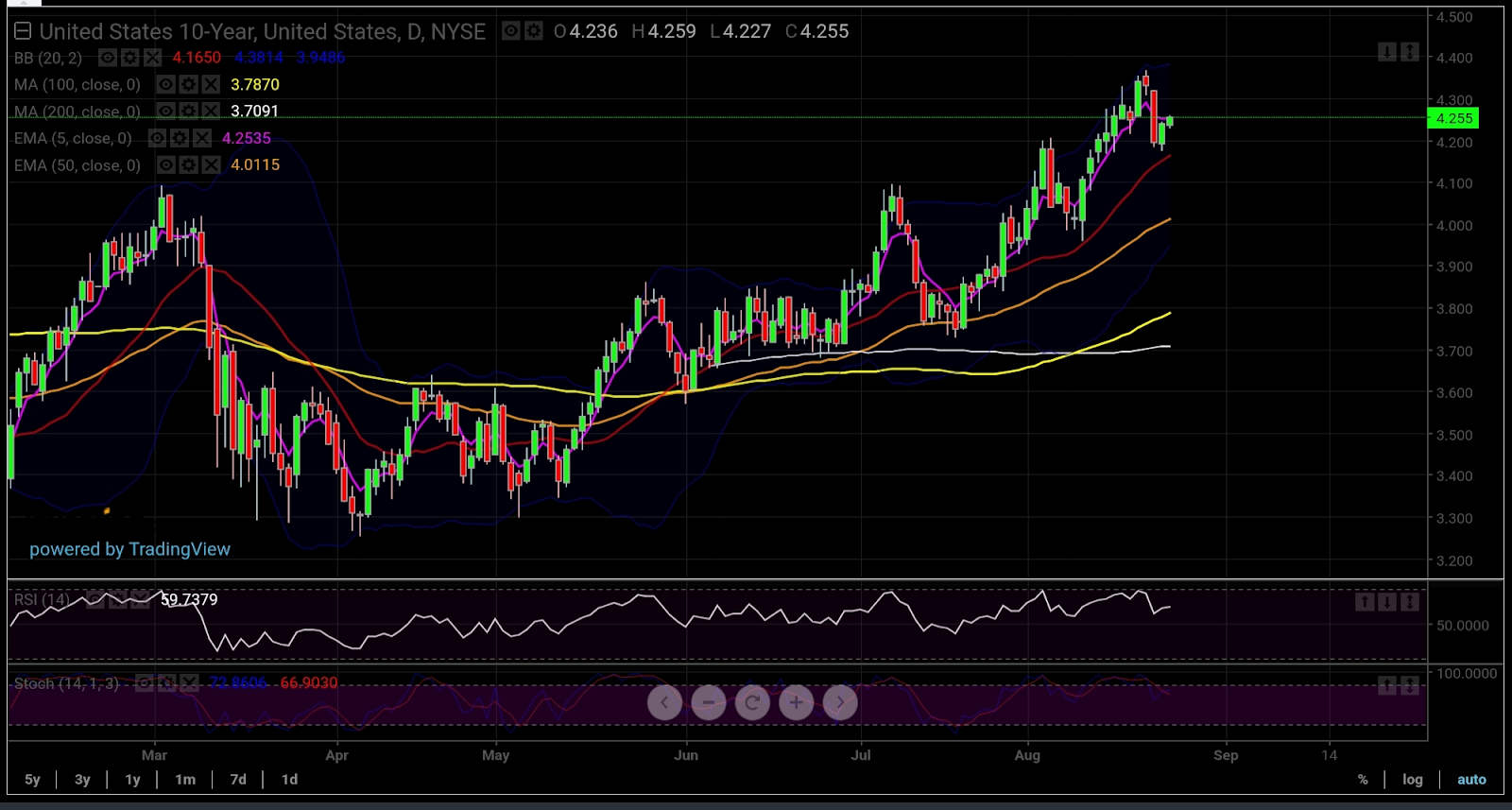- Data uncertainty through Sept 20 rate decision makes a call on Fed hard
- Spot gold could tumble to $1,850 if the dollar Index breaches 105.60
- On flip side, bullion could peak at $1,958 if DX goes below 103
Is going to stage a breakout post- today?
Aside from what Chairman Jay Powell says at the Fed’s flagship event in Wyoming, the answer lies almost certainly with how the and will react — and the impact of their combined actions on the yellow metal.
Of course, all that would be rote to those trading or following gold day in, and day out.
What isn’t known, though is how U.S. and global data would stack up over the next 3-½ weeks leading up to the Sept 20 rate decision of the Federal Reserve, which is still looking for a stay rather than a hike.
That’s super important because whatever Powell and his policy-making colleagues on the FOMC, or Federal Open Market Committee, say in the interim could turn academic in the face of that data. The central bank has repeatedly stressed that its decisions will be data-driven.
Still, the near-term direction is something our readers look forward to. And with gold’s stay in the $1,900-an-ounce lane looking as tenuous as possible — never mind the odds of it returning to $2,000 — we’ll attempt to plot the imminent highs and lows with the help of our regular collaborator in commodities charting, Sunil Kumar Dixit of SKCharting.com.
But first, a look at the tack Powell is likely to use at Jackson Hole and — notwithstanding that — the positives and red flags in gold’s way.
Powell’s Likely View
With price pressures cooling from a four-decade high of more than 9% in June 2022 to reach just 3% last month, Powell might see the need for his speech to be more rates-centric, to finish what’s left in the last mile of the central bank’s work: Returning to an inflation of 2%.
Former Fed Vice Chair Donald Kohn said in comments carried by Bloomberg said Powell likely “will caution against easing too soon”.
“I think that’s going to be a theme here. It would be actually helpful for him to spell out what he means by data-dependence, tamping down the very strong reaction of markets to each piece of data.”
Vincent Reinhart, chief economist at Dreyfus and Mellon, concurs, telling Axios:
“The fact is, the Fed is close to or at the interest rate plateau. The exact height of the plateau doesn’t matter that much because you can always compensate by how long you stay at it.”
Yet, some think the Fed chief might remain true to his style of playing it close to the chest.
Joseph LaVorgna, chief economist at SMBC Nikko Securities America, said in comments carried by CNBC:
“I just think he’s going to play it about as down the middle as possible. That just gives him more optionality. He doesn’t want to get himself boxed into a corner one way or another.”
If Powell does take a noncommittal strategy, that will put the speech in the middle of, for instance, 2022’s surprisingly aggressive — and terse — remarks warning of higher rates and economic “pain” ahead and 2020′s announcing of a new framework in which the Fed would hold off on rate hikes until it had achieved “full and inclusive” employment.
In gold’s favor:
- Big Trouble in Big China: The Chinese economy is all but grinding towards a halt, with its biggest property developers in trouble, bank loans at 14-year lows, exports with the biggest drop in 3-½ years, and the tumbling against the dollar. The has vowed to turn things around, but its rate cuts and stimulus have been too little, too late, say investors, who are asking instead for more targeted fiscal measures.
- Global factory activity remained mundane for August, as Japan reported shrinking factory activity for a third straight month while the eurozone registered a sharper-than-expected decline and Britain looked set to report weaker economic growth in the current quarter. U.S. business activity, meanwhile, approached a stagnation point in August, with growth at its weakest since February.
Working against gold:
- Labor market conditions remained tight despite the Fed’s aggressive rate hikes that have gone from a base of just 0.25% in March 2022 to 5.5%, with another one or two more upward moves before the year is out, FOMC officials keep indicating. The steady slide in weekly shows a U.S. labor market that is barely easing as quickly as the Fed desires, keeping the outlook for rates hopelessly hawkish.
Gold’s Near-Term Outlook Post-Jackson Hole:
Gold futures’ most-active December contract on New York’s Comex settled at $1,947.10 per ounce on Wednesday, virtually flat on the day, before reaching a 10-day high of $1,945.55 in the latest session.
The , known by its symbol XAU and is more closely watched than futures by some traders, also settled barely changed at 1,916.60 per ounce — after a two-week high of $1,923.94 reached in the prior session.
The dollar Index, or DX, which pits the greenback against six other major currencies, was at 104.112 after a two-week high of 104.215 earlier in the session.
Yields on the U.S. 10-year Treasury note was at 4.257 at the time of writing, just off a one-week high at 4.26. Prior to that, yields hit a 16-year high of 4.366 earlier this week.
Scenario 1: Stronger DX and Yields Vs. Gold:

Charts by SKCharting.com, with data powered by Investing.com
- The dollar Index extends advances above 104 and trades around 104.17.
- Stability above 104 will be supportive for the dollar Index to approach the next leg higher May high of 104.62, says Dixit of SKCharting. If the dollar Index succeeds in clearing through 104.62 and forms the base above this zone, it should witness a stronger rally toward the March high of 105.63 and 105.90.
- Yields on 10-year U.S. bonds have been making bullish waves with gradually higher lows and higher highs. A sustained break above 4.36 will put yields into unchartered territory and can possibly reach 4.60 -4.90. The bullish formation remains intact as long as the horizontal support base formed at 3.95 – 3.90 is not violated.
- Spot gold’s gains will likely be capped at $1,929-$1,935 as the dollar Index rises. DX’s extended advances above 104.62 will prove bearish for spot gold, with a potential for it to drop to a $1,885 base. Worse, the dollar Index’s rise to 104.90 and 105.60 will result in XAU dropping to the Monthly Middle Bollinger Band of $1,850.
Scenario 2: Weaker DX and Yields Vs. Gold:
- Recent advances in the dollar Index have been defying occasional weaknesses, and momentum seems to be approaching the overbought zone from where a pullback towards the 5-day EMA, or Exponential Moving Average, of 103.72 is likely. An eventual support base forming at the 200-day SMA, or Simple Moving Average, of 102.96 looks increasingly possible. If 102.96 breaks to the downside, the 100-day SMA of 102.23 looks likely.
- As the 10-year Treasury yield enters the bullish zone of 4.36, and unchartered territory in a significant span of time, a pullback towards the support areas of the daily Middle Bollinger Band of 4.16 is a high probability. Below this, a further drop to the 50-day EMA of 4.01 and 3.95 can hardly be ruled out. Weakness below this area can cause a further drop to 50-week EMA 3.6.

- If the dollar Index loses traction between 104.20-104.60, we could see it drop to as low as the 200-day SMA of 102.96. This will eventually extend the bullish rebound in spot gold towards the 50-day EMA of $1,930 and the 4-hour 200 SMA of $1,937.
- If DX extends correction below 102.96, expect XAU’s bullish rebound to reach beyond $1,937 and aim for the horizontal resistance of $1,945, followed by the weekly Middle Bollinger Band of $1954 and the 100-day SMA of $1,958.
***

Find All the Info you Need on InvestingPro!
Disclaimer: The aim of this article is purely to inform and does not in any way represent an inducement or recommendation to buy or sell any commodity or its related securities. The author Barani Krishnan does not hold a position in the commodities and securities he writes about. He typically uses a range of views outside his own to bring diversity to his analysis of any market. For neutrality, he sometimes presents contrarian views and market variables.


